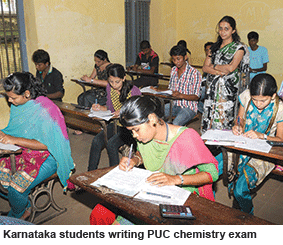 For 174,000 out of 650,000 higher secondary students across the southern state of Karnataka (pop. 64 million) who finally completed their Plus Two, aka pre-university, exam staged by the department of pre-university education (DPUE) on April 12, the preceding four weeks was a period of repeated punishment. The students had to write the chemistry exam not once, but almost three times.
For 174,000 out of 650,000 higher secondary students across the southern state of Karnataka (pop. 64 million) who finally completed their Plus Two, aka pre-university, exam staged by the department of pre-university education (DPUE) on April 12, the preceding four weeks was a period of repeated punishment. The students had to write the chemistry exam not once, but almost three times.
Their agony began on March 21, when the chemistry exam was scheduled to be held in 975 centres statewide. Two hours prior to the exam, DPUE officials learned that the question paper had been leaked to some students. After the 174,000 students had written the three-and-a-quarter-hour exam, DPUE cancelled the examination.
Subsequently, a re-examination of the paper was scheduled for March 31. However, the exam was cancelled the second time because hours before it was to commence, DPUE was alerted by the state CID (Criminal Investigation Department) that the question paper had been leaked again. Students were sent smses informing them of the cancellation on the morning of the re-exam.
Following widespread protests by parents and students, on April 4 the CID arrested three people — a physical education teacher of a private college in Bangalore, the personal assistant of Prakash Patil, minister for medical education, and one Rudrappa, a public works department employee.
The ill-starred chemistry exam was finally conducted under tight security on April 12. This time, DPUE, with help from the state’s CID and police, ensured question paper boxes were sent to the exam centres under heavy security.
Since then, CID investigations have found that the mastermind behind the repeated question paper leakages was a 65-year-old former headmaster of a government secondary school in Bangalore, a repeat offender who had been arrested five times since 2008 in connection with leaked school exam papers, but had never been convicted. While this worthy is on the run, the CID has filed a chargesheet under the Karnataka Organized Crime Act (KOCA) against the arrested suspects of the question paper leak. Under this legislation, the accused cannot get anticipatory bail and their movable and immovable assets are liable to seizure.
Meanwhile, the agony of the students was compounded by the Karnataka State PU College Lecturers and Principals’ Association calling an indefinite strike on April 5, demanding a pay increase. This meant the completion of the pre-university exam, already delayed because of the paper leakages and consequent re-exams, could be exacerbated with the students getting their exam results late. This places them in danger of missing the deadlines for writing public entrance exams for admission into engineering and professional education institutions. Fortunately after a two-week face-off, the lecturers called off the strike on April 19 “in the larger interest of the student community”.
Meanwhile, to ensure there’s no repetition of secondary and higher secondary (pre-university) paper leakages, on April 12 the state’s minister for primary and secondary education Kimmane Rathnakar announced his ministry’s intent to introduce a fool-proof system of online question paper delivery starting from the next academic year, on the model of the Visvesvaraya Technological University (VTU). In VTU, the exam question papers are randomly selected from a question bank, encrypted and transmitted to the examination centres minutes before the scheduled exam time.
Clearly, the antiquated primary-secondary school examination systems of Karnataka — ironically India’s #1 exporter of IT-enabled software and services — need to be digitised pronto. Repeated exam scandals of the type witnessed last month are likely to devalue the certificates issued by the state’s exam boards and education institutions to the point of worthlessness.
Jeswant J.M. (Bangalore)